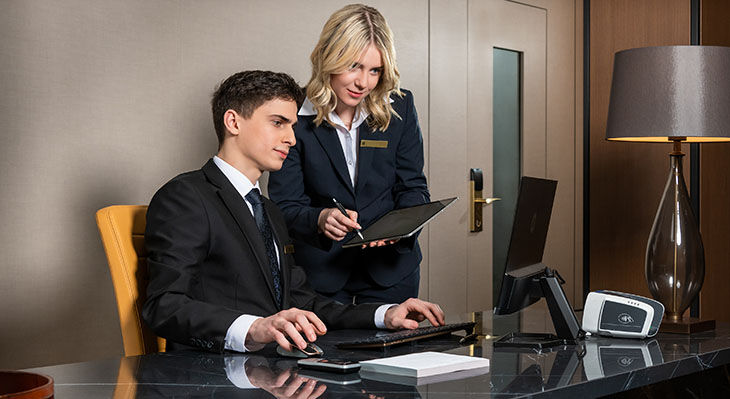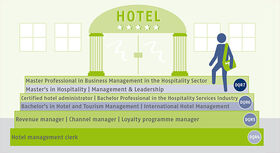Profile of an occupation – hotel management clerk
The hospitality sector was badly shaken up during the coronavirus pandemic. Modernisation of the hotel occupations thus occurred at the right time. The training occupation of hotel management clerk addresses many of the changes that have taken place in the sector and now offers business management aspects and further main focuses in the areas of HR and commercial management.

Hotel management as an occupational profile
Hotel management clerks (referred to as hotel clerks until 2022) work in the background to keep everything running smoothly and handle business-related aspects in the various areas of hotel operations. Their main tasks lie in the area of commercial administration. They obtain offers, select suppliers and calculate sales prices. They draw up marketing measures and develop price strategies. Further commercial tasks include processing payment transactions, bookkeeping, and the identification and evaluation of key business indicators. They are also involved in planning channel and revenue management (cf. Information Box) and the calculating events. Human resources, which encompasses personnel planning and acquisition, is another important area.
The occupation of hotel management clerk is particularly suited to people with a good head for figures and who are able to work precisely and as part of a team. Even though hotel management tends to function behind the scenes, dealing with guests is part of the daily work routine. Communication skills, organisational and sales talent, and knowledge of foreign languages are all helpful attributes.
An alternative to higher education study
The inclusion of “management” in the designation of the occupation is no coincidence. Modernisation has added areas previously often only taught in degree-level courses, such as channel and revenue management and content relating to instructing and leading staff. An increased number of unskilled and semi-skilled staff entering the sector means that even young skilled workers are now guiding these colleagues in their work and thus need the relevant competencies to carry out such tasks. As a result, this dual training programme has been upgraded to the extent that it now constitutes a good alternative to bachelor’s degrees in this field. It also offers the benefit of being very closely linked with actual practice in the hotel industry. To be able to fulfil their demanding and diverse tasks, trainee hotel management clerks spend time in every hotel department. They learn how to accept and store goods, for example. They also work in the kitchen, in service, in housekeeping, at reception and in the reservations department. These insights into every area of hospitality provide an important foundation and help trainees acquire an understanding of the complex interactions governing their later role in management.
Special term – channel management
Channel management is the development, implementation and control of various sales channels. The essential focus is on observation and adjustment of room prices and allocations offered via external providers and on the hotel’s own website.
Changes in the hotel industry
A growing differentiation of guests is changing the hotel sector. This means, for example, that typical business hotels are increasingly likely to accommodate customers who are not business visitors. Hostels are no longer the reserve of young people. Hotel managers need to react to this mixture of guest types. Hotel management clerks can, for instance, use market analysis and marketing plans to align services to various target groups.
Digitalisation is also bringing changes in its wake. Booking processes are digital, and messenger services are being used to enhance customer orientation and satisfaction via social media activities and guest communication. Hotel services are now being marketed on tourism platforms, and it is necessary to keep a close eye on evaluation tools. Even greater importance is being attached to sustainability as companies seek to hone their profile.
These changes to requirements within the sector are reflected in the training occupation updated in 2022. Links to modernisation are to be found in virtually all occupational profile positions contained within the training regulation.
What possibilities are available after training?

Foto-Download (Bild, 248 KB)
Employment opportunities are good given the fact that Germany has a total of over 28,000 hotels, inns and boarding houses. The number of jobs on offer is increasing again now that the pandemic is over. Just under 8,000 vacancies were being advertised in the hotel sector in January 2023; a rise of five percent compared to the same month in the previous year. Many career pathways are open to qualified hotel management clerks in areas such as controlling and HR. They may even progress to become senior hotel managers. These employment options are not limited to Germany; qualified workers enjoy development opportunities all over the world.
There is also a multitude of continuing and advanced training routes including Certified hotel administrator or Master Professional in Business Management in the Hospitality Sector. In the German Qualifications Framework (DQR), these statutory upgrading training regulations are aligned to the same reference levels as bachelor’s and master’s degrees in the field of hotel management.
At a glance
- Last updated: 2022
- Duration of training: 3 years
- Responsibility: Trade and industry
- Training structure: Mono-occupation
- DQR reference level: 4
- Advanced vocational training: Bachelor Professional in the Hospitality Services Industry, Certified hotel administrator, Bachelor Professional in Marketing, Certified specialist commercial clerk for human resources
- Occupational information from BIBB: www.bibb.de/de/153698.php
- Occupational information from the sector: www.dehoga-ausbildung.de/fuer-auszubildende/hotellerie/kaufmann-kauffrau-fuer-hotelmanagement
- “Structuring Training”: www.bibb.de/dienst/publikationen/de/18007
- Podcast on the profile of the occupation featuring two trainees (in German): www.bwp-zeitschrift.de/p173771
Sources: German Hotel and Restaurants Association (DEHOGA)
all links: status 13/06/2023
(Compiled by Arne Schambeck)
Translation from the German original (published in BWP 2/2023): Martin Kelsey, GlobalSprachTeam, Berlin